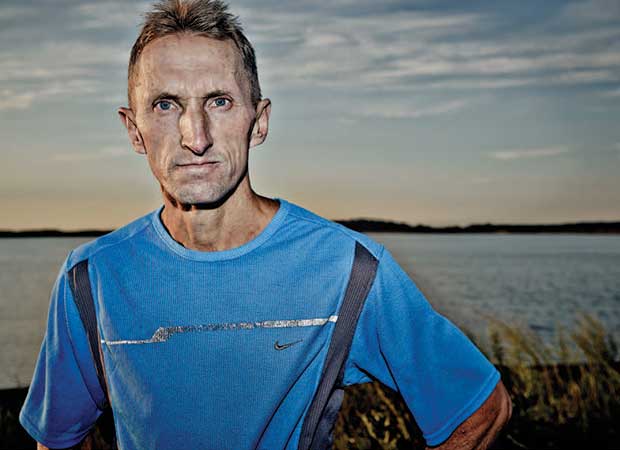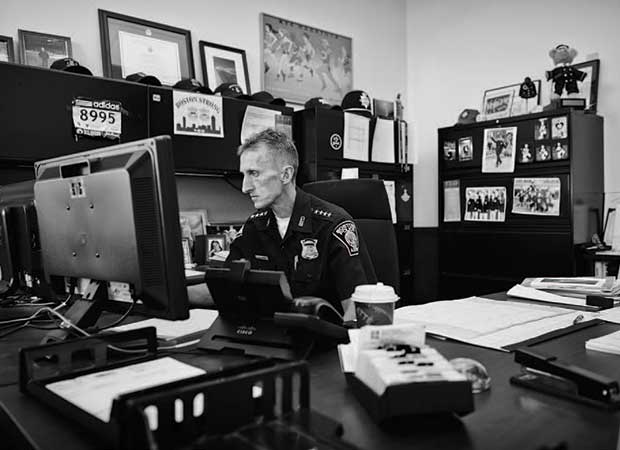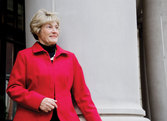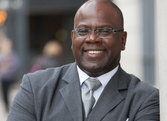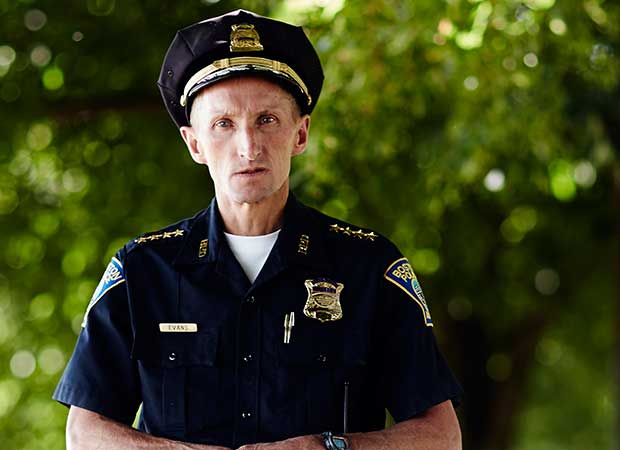
Boston Strong
Hub Police Superintendent William Evans, BS '82, has a "kill them with kindness" approach to law enforcement. Just don't mess with his city.
By Patrick Doyle
William Evans is restless. It’s 9:00 a.m. on a rainy day in late July, and the trim 54-year-old is already running way behind his normal schedule. Usually, by now, he’s left his office and hit the street to check in with his staff or to meet with public officials. Instead, he’s chained to his desk, wading through a stack of police reports.
As the superintendent of the Boston Police Department’s (BPD) Uniformed Branch, Evans functions like an air traffic controller, overseeing all of the city’s various police districts and 1,800 Boston cops who patrol those areas. Evans is the one who ultimately has to decide that a neighborhood needs a boost in officers, so he monitors the city’s crime reports and keeps in touch with his captains on a daily basis.
This morning, he’s digging through yesterday’s armed robberies. It’s mostly standard fare—a holdup with a knife in Roxbury; a pair of stickups in Dorchester. More troubling is the final report, which notes a late-night holdup in the Fenway by a group of young males—the third recent robbery in the area by similar suspects. He adds a note to his e-mail, a daily digest of violent crimes that he puts together for the commissioner and other senior members of the BPD. “I’m letting everyone know, including the head of the detectives, that we have a pattern here.”
A man who thrives on military-like discipline, Evans is up almost every day at 4:30 a.m. to get in his daily run, part of his regular marathon training; the walls of his office are festooned with medals from the 44 marathons he’s finished. After his workout, he arrives at police headquarters by 6:30 a.m. so he can complete his crime digest before the office starts filling up.
Today, though, he has more pressing concerns: He has to tour South Boston to ensure that the extra police presence he ordered was calming the frightened community. Three days earlier, a woman named Amy Lord had been abducted from the neighborhood, beaten, robbed, and stabbed to death.
The garish nature of the murder had turned the case into a media circus, and a half-dozen TV vans have been stationed outside her home since the incident. The police had arrested a “person of interest”—a 28-year-old former busboy named Edwin Alemany who had allegedly assaulted two other neighborhood women the same day—but were waiting to see if DNA evidence connected him to Lord. “I’m sure we’ll tie him to the [Lord murder],” Evans says.
“We’re just trying to build a case. It would be too much of a coincidence for three girls—[for] all of that to happen in 18 hours. I’ve lived over there all my life, and I doubt that’d happen.”
Until he has evidence, though, all Evans can do is increase the police presence in the area, reassure residents, try to calm themedia, and keep public officials up to date.
Evans pulls the jacket of his uniform onto his wiry runner’s frame, his pale blue eyes brightening, and asks, “Wanna go for a ride?”
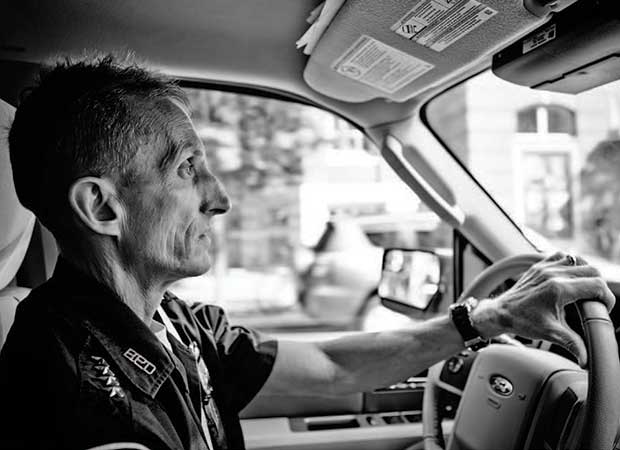
Tragedy Strikes
Downstairs, Evans swings by the office of Bernard O’Rourke, his deputy superintendent. Evans and O’Rourke are 32- and 35-year veterans of the BPD, respectively; years earlier, they served as captains together. Today, O’Rourke is his right-hand man.
The two slide into a marked Boston Police SUV in their usual positions: O’Rourke drives while Evans sits shotgun, fielding the calls that continually light up his iPhone. Driving in the South End, they note how much safer the area is than when they started on the force, a fact they attribute to better community policing and rising real estate values. As they wait for a stoplight, they watch people heading toward the methadone clinics in Andrew Square. When he gets a green signal, O’Rourke steers over the bridge into South Boston, Evans’ longtime home.
William Evans was born in this neighborhood to Paul and Catherine Evans, a truck driver and a stay-at-home mom. He was the youngest of six boys, and the whole family was crammed into a two-bedroom apartment on the second floor of a triple-decker. William and the other two youngest brothers all shared a bed in a converted closet.
The Evans family was firmly enmeshed in working-class South Boston. The boys roamed through the streets, playing Wiffle ball and tag football. “Life was a lot simpler then,” he says. “Neighbors looked out for each other. It was such a close-knit neighborhood.”
And in an area where everyone had a nickname, William’s was “Mouse,” for his diminutive size. A half-century later, he still can’t escape it. “Even today,” he says, “I’ll be in full uniform in the neighborhood and people will shout, ‘Hey Mouse!’ and I’m like, ‘Oh my God.’”
Tragedy, though, left the Evans family reeling time and again. When William was only three years old, his mother, just 37, died of ovarian cancer, leaving his father with six boys under the age of 12. Then, six years after his mother’s death, William’s older brother Joe was killed by a hit-and run driver while crossing the street by the beach in South Boston. Joe was 11, William just 9. The whole family was devastated, but especially his father.
A few years later, Paul Evans died of a heart attack, leaving William orphaned. His brothers were on the way to starting their lives, but William was barely a teenager. As aunts and uncles came forward and volunteered to take him in, the older brothers pushed back. No, they insisted. We’ll watch him.
William stayed in the second-floor apartment with his brother John; his eldest brother, Paul Jr., by then a police officer, lived on the third floor with his wife. They enrolled William at St. Sebastian’s, a Catholic prep school then in Newton, Massachusetts. He thrived there, under the watchful eyes of his brothers. “Everyone pitched in and helped out and made sure he was toeing the line,” says Paul. “He would come up and have dinner with us, and my wife would make sure he was getting his homework done.”
After graduating high school, William and a friend decided to go to Chaminade University in Hawaii. “I was on my own,” he says. If he had stayed in Boston, “I would have lived with my oldest brother and his newlywed wife. And I said, ‘I gotta get away from here.’”
William liked Hawaii, but he found the weather and the place almost too nice. “It was like summer school all the time,” he says. “It was tough to actually go to school.”
He also desperately missed home and his brothers, so after his freshman year, he moved back east and enrolled at Suffolk University. “I liked Suffolk, and it was close by,” he says. “I was also interested in government, and what better place to go to school than right by the State House?”
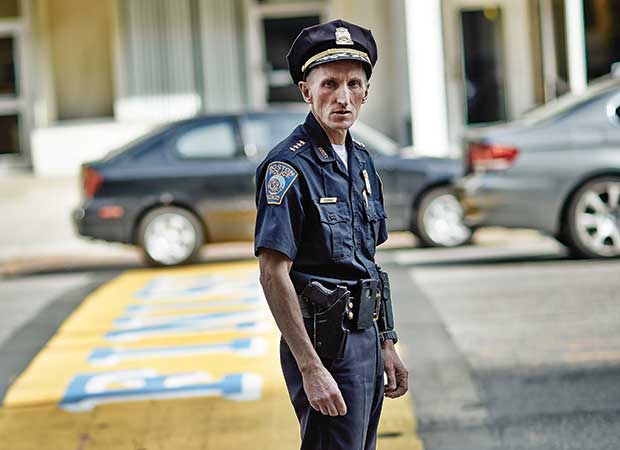
Because of Who He Is
Suffolk proved to be a turning point in Evans’ life. At the time, he was debating whether he wanted to join the police or the fire department after college. His brother Paul Jr. was rising through the BPD, while John and James both worked for the Boston Fire Department. Evans’s classes at Suffolk broke the tie in favor of the police.
“A lot of the things I learned there helped me,” he says. “In particular, how criminal justice worked, how the political system worked, and the social issues—drugs and alcohol—how they worked. It sort of rounded me out, and that made a big difference.”
In 1980, Evans joined the cadet program at the BPD, which helped introduce young people to the department for mostly administrative positions. He took classes at Suffolk during the day, and still worked at the BPD’s District Four in the South End at night. While there, he met a young woman from Roslindale named Terry who was employed in a summer youth work program. After a few years of friendship, they started dating.
Upon graduating from Suffolk and the cadet program, Evans joined the BPD full-time. He worked as a patrolman for five years, winning a medal of honor with his partner after they apprehended an armed robbery suspect following a high-speed chase. While he loved working the street, Evans found that his study habits from college and dogged work ethic helped him ace the tests required to ascend the ladder of the police force. In 1987, he took his sergeant’s test and scored the top in his class. Five years later, he had among the highest scores for his lieutenant’s test. In 1997, he topped his class for the captain’s test.
Evans’ climb in the BPD could have been hampered by the fact that his brother, Paul, had become police commissioner in 1994. While nepotism was scorned in the department, his high test scores ensured that no one could protest his promotion. “I think it’s very, very difficult in an organization like the police force if you have a brother who is high-ranking or a commissioner—everyone is watching what you do,” says Paul, who left the department in 2003. “But if you look at his career, he’s done it because of who he is—not because of his brother. In fact, I’d say he did it in spite of who his brother was.”
Once he became captain, Evans was assigned to Allston-Brighton, a neighborhood dominated by college students. Quality-of-life issues—public intoxication, noise complaints,fighting—were the major problem in the area. Evans began taking college administrators on ride-alongs, started addressing students during orientation week, and even leaned on landlords to keep a closer eye on troublesome properties. His proactive approach became the model for other college neighborhoods.
By the time he was captain, Evans was building his own family. He and Terry married in 1988 and she moved to South Boston. Terry worked first as a freelance journalist before moving into teaching. They went on to have three kids, Carolyn, John, and William. Terry and the children got used to Evans’ always-on-call job that left him dashing out of family gatherings, sporting events, and even their home in the middle of the night. “You just learn to take things in stride—it becomes normal,” says Terry. “Sometimes, when you see him and the events on the news, it sort of gives you a different perspective. Like, ‘Oh, wow, we know him!’”
